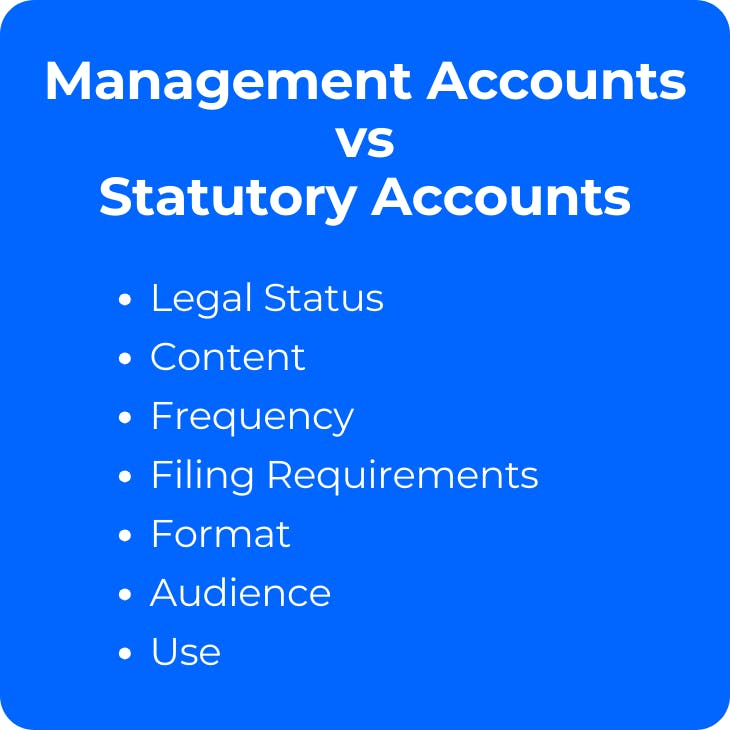Management accounts are internal financial reports that help monitor performance and guide business decisions in Hong Kong companies.
Statutory accounts are legally required and must be prepared in accordance with the Companies Ordinance (Cap. 622) and applicable Hong Kong accounting standards.
Understanding both management accounts and statutory accounts is essential for ensuring regulatory compliance and developing a compliant and sound business strategy.
Outsourcing accounting services to professionals like Air Corporate can streamline the accounting process and help ensure accuracy and compliance.
Understanding the difference between management accounts and statutory accounts is crucial for business owners, directors, and decision-makers.
In Hong Kong, all companies are required to prepare statutory accounts under the Companies Ordinance, while management accounts are optional but highly valuable for day-to-day business operations and financial planning.
Both types of accounts help monitor a company’s finances and forecast future performance. That’s why understanding Hong Kong accounting standards, statutory financial statements, and internal management reporting is critical to ensure your company complies with the law and remains financially healthy.
What is a Management Account in Hong Kong?
As the name suggests, accounts that aid in the internal decision-making process of a company are known as management accounts. They are cumulative financial statements prepared during the financial year of a business and are a key part of internal financial reporting in Hong Kong. Most companies use management accounts for better financial control, budgeting, and performance tracking.
The primary objective of management accounts is to track financial metrics and key performance indicators, providing deeper insights into a business’s operational and financial performance. These internal accounts are generally not shared externally and are rarely available to shareholders unless the company is facing financial difficulties or restructuring.
What Does a Management Account Typically Include?
Typically, here’s what is included as part of a management account:
- Balance Sheet
- Profit and Loss Statement
- Cash Flow Statement
- Key Performance Indicators (KPIs)
- Executive Summaries
- Customer and Supplier Analysis
- Project Updates
- Operational Metrics (Production and Delivery)
These reports can be generated using accounting software such as Xero, QuickBooks, or Sage, often with near real-time dashboards that update automatically based on recorded transactions.
Are Management Accounts Mandatory in Hong Kong?
Management accounts are not legally required under Hong Kong law. However, they can be particularly helpful for:
- Startups looking to manage burn rate and plan financial projections
- SMEs seeking better financial visibility and internal controls
- Companies preparing for audits, due diligence, or investment rounds
- Businesses applying for bank loans, credit facilities, or government grants
While a stat account is prepared once a year, management accounts help ensure you are not waiting 12 months to identify financial risks or cash flow issues.
How Often Should a Management Account Be Created?
Unlike statutory accounts, which are prepared annually, management accounts are more flexible. Businesses typically prepare them monthly or quarterly, depending on the nature and pace of operations.
- Monthly management accounts provide more timely financial visibility and are beneficial for fast-growing companies, startups, and retail or e-commerce businesses that require frequent financial updates.
- Quarterly management accounts are often suitable for businesses that operate at a slower pace or are seasonal, where continuous tracking is less critical.
The faster your business changes, the more often you should review.
What Are Statutory Accounts in Hong Kong?
Statutory accounts, also known as audited financial statements or company accounts, are the annual financial statements that Hong Kong companies must prepare in accordance with Hong Kong Financial Reporting Standards (HKFRS) or the Small and Medium-sized Entity Financial Reporting Standard (SME-FRS) and with disclosure requirements in the Companies Ordinance (Cap. 622).
Most companies must have these accounts audited, except when the company is dormant under Section 447.
Companies choose their own financial year-end. The 1 April to 31 March period is the Government’s fiscal year, not a requirement for all companies.
Purpose of Statutory Accounts
The main goal of statutory accounts is to:
- Demonstrate financial performance to members and stakeholders
- Fulfill legal duties under the Companies Ordinance (Cap. 622)
- Comply with HKFRS or SME-FRS
- Present a true and fair view of financial position and results
What Should Be Included in Hong Kong Statutory Accounts?
The exact scope of information included in statutory accounts depends on the size and structure of your company.
Under Hong Kong law, companies are required to prepare statutory accounts, meaning the statement should include the following financial reports:
- Balance Sheet
- Profit and Loss Account
- Notes to the Accounts
- Audited Financial Statements for the relevant financial year (noting that a company’s financial year-end may differ from the tax year of assessment)
- Auditor’s Report and Opinion
- Directors’ Report
- Cash Flow Statement (subject to applicable exemptions under SME-FRS)
These documents must be prepared in accordance with HKFRS or SME-FRS (for qualifying entities), audited by a Hong Kong practicing Certified Public Accountant (CPA), approved by the board of directors, and presented to shareholders for adoption.
Compliance and Filing Obligations of a Statutory Account
All companies in Hong Kong, except those classified as dormant under Section 447 of the Companies Ordinance, must:
- Prepare financial statements in accordance with Sections 380–383 of the Ordinance
- Appoint a Hong Kong CPA to conduct a statutory audit
- Submit audited financial statements together with the Profits Tax Return to the Inland Revenue Department
For public companies or companies limited by guarantee, additional financial documents may also need to be delivered to the Companies Registry in accordance with statutory filing requirements.
Reporting Exemption and Simplified Accounts
Under the Companies Ordinance, certain private companies may qualify for reporting exemption and be allowed to prepare simplified financial statements and directors’ reports.
To qualify as a small private company, the business must meet two out of the following three criteria:
- Annual revenue of HK$100 million or less
- Total assets of HK$100 million or less
- 100 or fewer employees
Alternatively, exemption may be granted with:
- 100% shareholder approval
- A 75% shareholder resolution with no objections
Even where simplified financial statements are permitted, an audit is still required unless the company has formally elected dormant status.

How Do Management Accounts Differ from Statutory Accounts?
Why Management Account and Statutory Account Matter
The Role of Each Type of Account
Management accounts and statutory accounts both play essential roles in supporting a business. While each serves a different purpose, together they provide a clearer and more complete financial picture.
Further, a management account offers timely financial insights that allow businesses to monitor performance, manage cash flow, and make informed operational decisions.
Statutory accounts provide an annual financial summary required for legal compliance and accurate tax reporting. They also offer transparency to shareholders and external stakeholders, such as investors or lenders.
Why Businesses Benefit from Both
When combined, management accounts and statutory accounts give a comprehensive view of a company’s financial health. The forward-looking insights from management accounts complement the historical, year-end reporting found in statutory accounts, supporting both daily decision-making and long-term compliance.
Professional Support
Businesses that are unsure how to manage internal reporting and statutory compliance often seek professional advice. Accounting services can help ensure financial information is accurate, compliant, and prepared in line with Hong Kong regulatory requirements.
Benefits of Management Accounts In Hong Kong
- Management accounts provide up-to-date information on cash flow, revenue, and financial position, enabling informed business decisions and early identification of financial stress.
- Regular review of management accounts can help detect unusual transactions or discrepancies that may indicate errors or fraud.
- Chartered accountants frequently rely on management accounts to estimate profits and assess provisional profits tax liabilities for planning purposes.
- Management accounts support informed dividend declarations by providing clarity on distributable reserves.
- Well-maintained management accounts streamline the annual audit by giving auditors a clear overview of financial activity.
- They help detect and correct accounting errors before year-end.
- By tracking spending trends, businesses can reduce inefficiencies and optimise resource allocation.
- There is no prescribed statutory format, allowing companies to tailor reports to their internal needs.
Benefits of Statutory Accounts In Hong Kong
- Statutory accounts provide a structured and regulated overview of a company’s financial position.
- Investors, regulators, and lenders rely on statutory accounts to assess financial performance and risk.
- They provide an accurate and fair representation of the business, helping ensure compliance with the Companies Ordinance.
- Statutory accounts act as a control mechanism to identify potential misstatements or irregularities.
- They highlight operational efficiency and can reveal areas for improvement in internal processes.
Bottom Line
Whether you are running a growing SME or an established business, timely and accurate accounting is essential for long-term sustainability.
Air Corporate offers accounting support to help ensure statutory accounts and management accounts are prepared accurately and in line with Hong Kong regulatory requirements, allowing business owners to focus on operations while meeting compliance obligations.
FAQs
Where Section 789 applies, a registered non-Hong Kong company must deliver a certified copy of its latest published accounts with its annual return (Form NN3) within 42 days after each anniversary of registration.
An unqualified opinion indicates the financial statements present a true and fair view in accordance with HKFRS/SME-FRS. A qualified, adverse, or disclaimer opinion signals limitations or departures that users should consider.
There is no direct penalty in the Companies Ordinance for the time taken to prepare accounts, but late or incorrect filing of the PTR and supporting audited financial statements with the IRD can lead to penalties under tax law. File on time and keep complete working papers.






